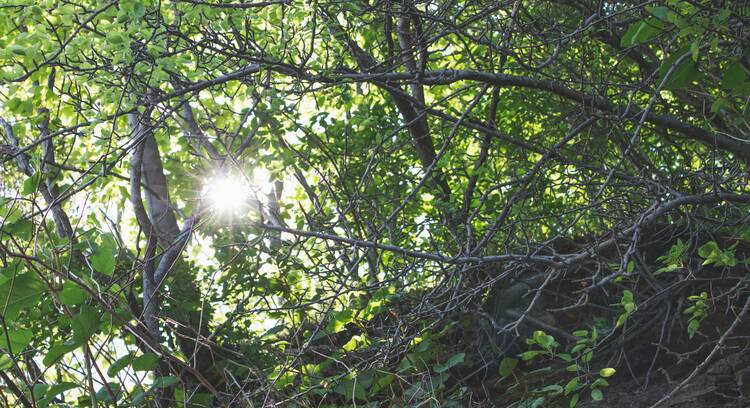A Reflection for Wednesday of the Sixteenth Week in Ordinary Time
Find today’s readings here.
“… and it withered for lack of roots.”
Walking through my neighborhood, I am constantly reminded of the awesome power of roots. As I have often told my kids: “We are a neighborhood rich in trees and poor in walkable sidewalks.” On the one hand, we have the shade, breezes and plentiful homes for the birds that our large trees provide. On the other hand, we have to walk very carefully. The roots grow in every direction and push up through the concrete sidewalks, creating a challenging obstacle course.
When we humans built this neighborhood, we thought we could just tame the trees; plant them in the ground, pour concrete around them and dictate their future. But the trees had a different calling, which was to be nurtured by sunshine and rain, and in this way thrive and grow. They are an example for us all. In Laudato Si’, Pope Francis reminds us that “nature cannot be regarded as something separate from ourselves or as a mere setting in which we live. We are part of nature, included in it and thus in constant interaction with it.”
The prophet Jeremiah knows he is part of nature. Young and unsure, he is a human creature just starting to discover himself and feeling the pull of God toward the sunlight. As a youthful shoot, it is God’s assurance that frees him from his fears. God promises Jeremiah three things that God also promises us.
1) Our life is meaningful, not random. In knowing us and choosing us, God is communicating our uniqueness, our gifts and in many ways how indispensable we are to the family of creation.
2) We have work to do, and this work belongs to God. When we are intentional and attentive to God’s loving movements inside our hearts, our human smallness becomes a vessel into which the Holy Spirit can pour herself. It is much easier to be bold in what we do when we realize it is for God’s sake that we do it, not out of our own (limited) agendas. As the great theologian Gustavo Gutiérrez beautifully put it, “we don’t love the vulnerable poor because they are good, but because God is good.”
3) We are never alone. The hard work, the disappointments, the doubts, and the questions of living out our faith can feel precarious. Like Jeremiah, many of the prophets had to face the difficulty of a demanding life of service to God and God’s creation. As Jeremiah sees it, he will have to tear some things down in order to build and plant those things that please God and advance God’s vision. As Psalm 71 exhorts us, ours has to be a voice constantly declaring God’s justice.
The Gospel of Matthew continues the story of roots. It lets us glimpse Jesus’ own creatureliness and exhaustion. Apparently, he just wanted to sit quietly and contemplate the sea, but soon people were pressing down on him from every direction. So much so that he asked his friends to take him out on a boat so he could at least have a little room.
I imagine Jesus on that fishing boat, digging deep within himself to find the fertile roots nurtured by the prophets of his Jewish faith. They left their eloquent witness that God’s work is demanding work. Jesus remembered his powerful roots and stood up on the boat weaving the beautiful images of the sower, the seeds, and all that would crush them. He was sure of the rich soil that surrounded this community, and he wanted to help them look toward the light and drink from the plentiful rain of God’s wisdom.
Yes, there will be many times when we will be tempted to be circumscribed, afraid, choked off from bearing fruit. Jesus wants us to be like the trees in my neighborhood, unafraid of the concrete that would hold us. He wants us to break it up with our robust and faithful roots and like the trees be glorious witnesses to the glory of God.







